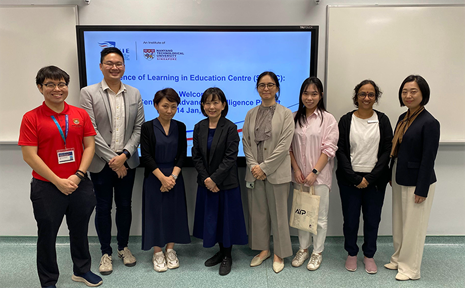Redesigning Pedagogy International Conference 2022
The ninth Redesigning Pedagogy International Conference (RPIC) – a three-day education research conference organised by the National Institute of Education (NIE), Nanyang Technological University (NTU), Singapore – took place from 30 May to 1 June 2022. The RPIC 2022 was conducted in a hybrid format, with online and in-person sessions conducted across the three days.
The conference programme includes a list of keynote presentations, paper and symposium presentations, workshops and masterclasses. These sessions provided an engaging platform for the conference delegates to creatively explore the answers to critical questions.
The RPIC 2022 opening ceremony took place at the Nanyang Auditorium, NTU. The ceremony started with an opening performance by a group of music students from NIE’s Visual and Performing Arts Academic Group. They have specially put together an arrangement of popular pieces to welcome the conference delegates attending the ceremony online and in person.

Opening ceremony performance by NIE Visual and Performing Arts Academic Group Students
Following the opening performance, NIE Director Prof Christine Goh gave a welcome address. In her welcome address, she explained that the conference theme “Transforming Education and Strengthening Society”, underscores NIE’s strategic focus to develop current and new capabilities to take advantage of present and future opportunities to build a better society through education.
She highlighted the urgent need to re-envision education and schools for the future in a rapid changing world. The NIE Director also shared that the research carried out at NIE supports the Singapore education system to develop future-ready learners and teachers, inform policy formulation and programme design, and build on the best educational practices with the future in mind.
.png?sfvrsn=cbb0656e_0)
Welcome address by NIE Director, Prof Christine Goh
After the welcome address, Minister for Education, Mr Chan Chun Sing, gave an opening speech to the delegates. In his opening speech, he emphasised that the world has changed and there is a need to adjust the way we teach and learn. He shared seven shifts in the education landscape, some of which includes a change in the way knowledge is shared and received, a greater demand for holistic education and instilling a collaborative spirit in students.
The conference was attended by close to 1,200 delegates across the three days. The delegates comprise teachers, educators, practitioners, researchers and policy makers.
The keynotes by renowned speakers are listed below:
- “Schooling to Build Robust Societies” by Prof Diana Hess, University of Wisconsin-Madison, United States of America
- “Reimagining Teacher Education in a Post-COVID world” by Emeritus Prof John Loughran, Monash University, Australia
- “Cultivating Robust Education Research for the 21st Century: The Interesting Case of Singapore” by Dr Dennis Kwek, National Institute of Education, Nanyang Technological University, Singapore
- “Integrating Critical Media Literacies and Socioscientific Issues Across the Curriculum: Towards 21st Century Pluricultural Education” by Prof Angel Lin, Simon Fraser University, Canada
- “Embracing Language Diversity in Schools and Societies” by Assoc Prof Gigi Luk, McGill University, Canada
- “The Architecture of the Child Mind: Theoretical Considerations, Empirical Study, and Future Implications for a Positive Student-Centered Educational Curriculum” by Dr Marc Bornstein, Eunice Kennedy Shriver National Institute of Child Health and Human Development, United States of America; UNICEF, United States of America; International Research Fellow, Institute for Fiscal Studies, United Kingdom







